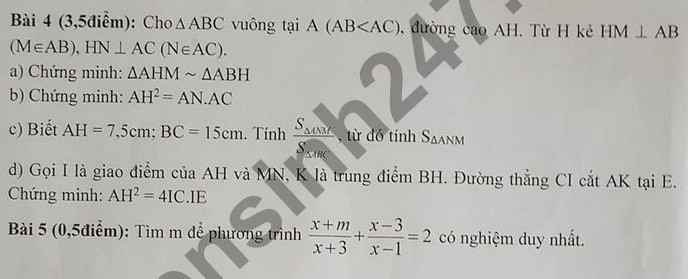\(A=2xy+\dfrac{1}{2}x\left(2x-4xy+4\right)-x\left(x+2\right)\\ =2xy+x^2-2xy+2x-x^2-2x\\ =\left(2xy-2xy\right)+\left(x^2-x^2\right)+\left(2x-2x\right)=0\)
Vậy GT biểu thwusc A không phụ thuộc vào giá trị của biến
\(B=\left(2x-1\right)\left(2x+1\right)-\left(2x-3\right)^2-12\\ =\left[\left(2x\right)^2-1^2\right]-\left[\left(2x\right)^2-2.2x.3+3^2\right]-12\\ =4x^2-1-\left(4x^2-12x+9\right)-12\\ =\left(4x^2-4x^2\right)+12x+\left(-9-1-12\right)\\ =12x^2-22\)
Vậy biểu thức B có phụ thuộc vào giá trị biến
a: =2xy+1/2x*2x-1/2x*4y+1/2x*4-x^2-2x
=2xy-x^2+2x+x^2-2xy+2x
=0
b: \(=4x^2-1-12-\left(4x^2-12x+9\right)\)
=4x^2-13-4x^2+12x-9
=12x-22
c: \(=x^3+6x^2+12x+8-\left(x^3-9x^2+27x-27\right)-10x\)
=x^3+6x^2+2x+8-x^3+9x^2-27x+27
=15x^2-25x+35
d: \(=x^3-3x^2+3x-1-x\left(x^2-4\right)-\left(x^3+x^2+x+2x^2+2x+2\right)\)
\(=x^3-3x^2+3x-1-x^3+4x-\left(x^3+3x^2+3x+2\right)\)
\(=-3x^2+7x-1-x^3-3x^2-3x-2\)
=-x^3-6x^2+4x-3
\(C=\left(x+2\right)^2-\left(x-3\right)^2-10x\\ =\left[\left(x+2\right)+\left(x-3\right)\right]\left[\left(x+2\right)-\left(x-3\right)\right]-10x\\ =\left(2x-1\right).5-10x\\ =10x-5-10x\\ =-5\)
Vậy BT C không phụ thuộc vào giá trị biến
\(D=\left(x-1\right)^3-\left(x+2\right)\left(x^2+x+1\right)-x\left(x-2\right)\left(x+2\right)\\=\left(x-1\right)\left(x^2+x+1\right)-\left(x+2\right)\left(x^2+x+1\right)-x\left(x^2-4\right)\\ =\left(x^2+x+1\right)\left(x-1-x-2\right)-x^3+4x\\ =-3\left(x^2+x+1\right)-x^3+4x\\ =-3x^2-3x-3-x^3+4x\\ =-x^3-3x^2+4x-3\)
Vậy D không phụ thuộc giá trị biến
















